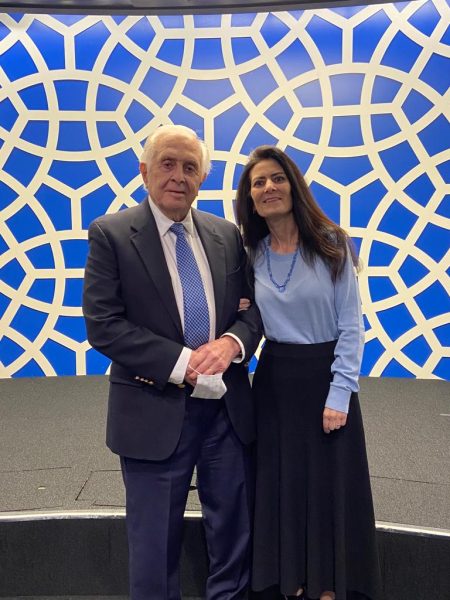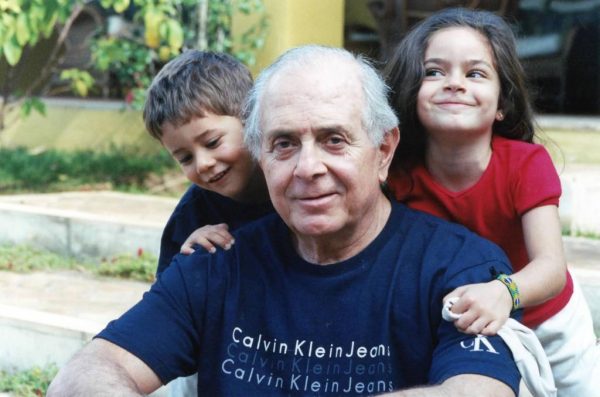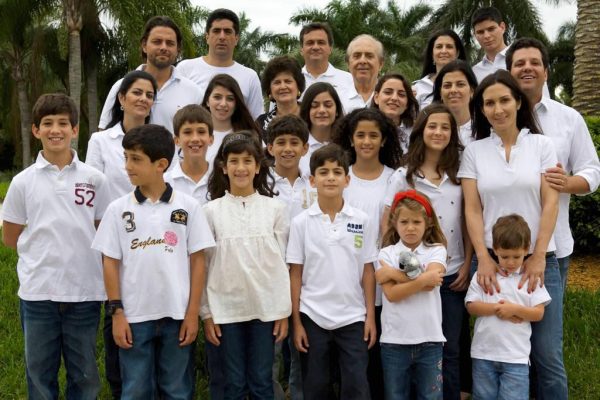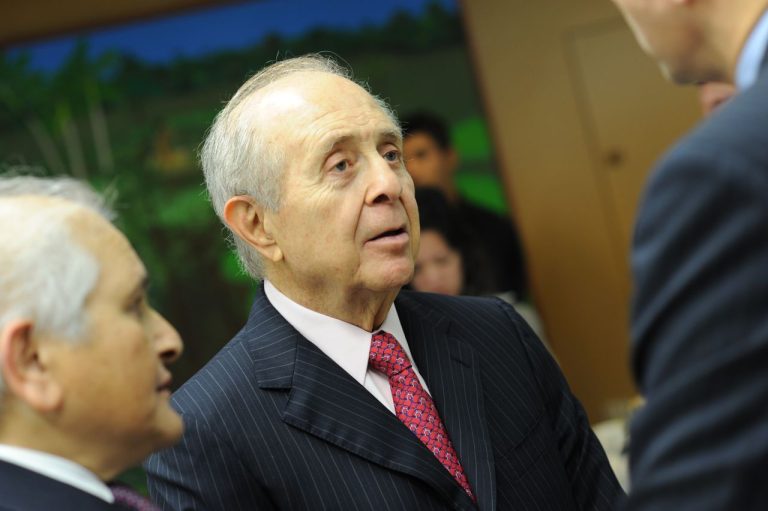São Paulo – When Brazil and the Arab countries were much more unknown universes for each other, a Brazilian businessman, engineer Walid Yazigi (pictured above), led the Arab-Brazilian Chamber of Commerce (ABCC) ’s first business mission to the region. It was the 1980s, and Yazigi was president of the institution that works to bring about economic and cultural ties between Brazil and the Arab nations. “We needed to present ourselves to the Arab world,” said Yazigi, aged 88, when recounting his life and career path to ANBA.

Yazigi was president of the ABCC for three terms in the 1980s and 1990s, vice president in the 1990s, and board chairman for almost twenty years until 2021. Today, in addition to a name that awakens respect among Brazil-Arab trade players, Yazigi is seen as an inspiration for those who succeeded him in the leadership of the ABCC. His father, José Nicolau Yazigi, was one of the co-founders of the institution.
Praising Yazigi’s business capacity, the current president of the ABCC, Osmar Chohfi, highlighted the importance of the engineer’s role in the entity. “He knew how to devote his talent and time to an important role in the ABCC, following his father’s steps. As president, he was very committed to the activities, brought a vision of the future, and gave an exceptional character to his work at the ABCC,” Chohfi said.

In the first mission in the 1980s, executives and businesspeople from successful companies in Brazil traveled to eight Arab countries with little knowledge about the region, seeking to sell planes, poultry, coffee, sugar, buses, and soybean. The then secretary-general of the ABCC, foreign trade specialist Michel Alaby, reported that, despite this, the doors were opened for the mission in a “fantastic” way in the countries visited, including Iraq, Saudi Arabia, the United Arab Emirates, Lebanon, and Syria.
Yazigi said with joy that to get to the Middle East, the group traveled to France and, from there, boarded a chartered plane painted by Air France with the Brazilian flag, which impressed the local business community and authorities upon arrival. “It was astonishing. When we arrived in Arab countries, they looked at that monster with the Brazilian flag and asked: Whose plane is that? Is it from the Arab-Brazilian Chamber?” he said.
Yazigi led several missions during his tenure at the ABCC and numerous other actions that brought the entity to its current path, including its financial solidity. Alaby described Yazigi as a natural leader, charismatic and just. More recently, as board chairman, he encouraged the move of the ABCC’s headquarters to a more spacious and improved address and the choice of renowned architect Ruy Ohtake to design the offices.
A family story
In addition to his work at the ABCC, Yazigi has a history of volunteer work at Esporte Clube Sírio, Hospital do Coração, and the Antiochian Orthodox Cathedral. His father, José Yazigi, and his mother, Helena Yazigi, had already followed the path of charitable service. “When my mother would go to Rua 25 de Março [São Paulo’s shopping street], the shop owners would see her and hide,” laughed Yazigi, remembering when Helena Yazigi sought donations for works of charitable institutions.

Helena Yazigi, the daughter of Syrian parents, was born in Brazil. José Yazigi, in turn, came from Syria at the invitation of his uncles and, after some comings and goings, ended up establishing a textile business in São Paulo. The production plant was José Yazigi’s biggest bet for the professional life of his son, the only man among six siblings. But Yazigi had other plans, tastes, and desires.
“I liked watching buildings digging their foundations, then being erected, finished, and inhabited. I could see the work progress of those who designed and constructed the building, so I wanted to work in this area,” he said. Yazigi enrolled in the Civil Engineering undergraduate course at the Polytechnic School of the University of São Paulo (USP) in one of the top positions. The result came naturally – he had a solid performance since the beginning of his studies at school and later at the Reserve Officer Preparation Center (CPOR).

Studious, focused, and dedicated to his work, Yazigi is a big sports fan. This was how Yazigi established a construction company on his own, first doing almost everything by himself, then seeing the business create different departments – from structural calculations to hydraulic design – to handle the size it was gaining. A book written by Yazigi, “A Técnica de Edificar” [loosely translated as “The Technique of Building”], is still a reference for academic research today. He is also the author of two other books on immigration and gastronomy.
His father closed the factory when his son did not want to pursue the textile business, but Yazigi, a father of four daughters and one son – the latter who died at a very young age – brought his girls into the business. Two of them, a business manager and an engineer, now lead the construction company with which Yazigi is no longer involved full-time. “They are dedicated, don’t make mistakes, and are extremely efficient,” he said. The other two have also studied Administration and Engineering, but one lives abroad, and the other is an athlete and accrues medals in cycling competitions.
The daughters
When it came to the memories of one of his proudest moments in life, Yazigi mentioned his daughters. Used to being pampered by his five sisters, after marrying Arlette, he found himself in a nearly all-female family. And he was a devoted father. In leisure periods at the beach, while other parents did their own activities, Yazigi led his daughters in water skiing.

“In my house, we didn’t need to work in the kitchen; my father said – you have to study, get a degree, and work. We were taught that way, and we were all good students,” said one of the daughters, Claudia Yazigi. She described her father as a fair man. “If you gave popcorn to one, you would need to give it to all,” she said. “He was always affectionate and present. He never raised his voice. We have a lot of admiration for him,” said her.
The daughters were called upon to accompany Yazigi in sports. His wife, Arlette Yazigi, was also by his side in everything he experienced, including travel, physical activities, and adventures. Despite not being a fan of sporting activities, she climbed the pyramids with her husband and faced the steps of the Leaning Tower of Pisa in Italy. “If you are going to get married, you have to marry a man like Walid. I would only marry someone like him. I was lucky,” she said.

Anyone with the opportunity to have a slightly longer dialogue with the engineer realizes he is dedicated to what he undertakes. “I overcome my deficiencies with work and effort,” he said. It is also possible to see that he is a man who loves people and friends and knows how to laugh and have fun. Yazigi fills his own life story with humor, bringing funny stories of the events he experienced or that surrounded him.
About to turn 89, despite being away from the daily activities of the ABCC, the engineer continues to look at the Arab world. The current war between Israel and the Palestinians is a concern of his, as are the rights of the Arabs and the progress of Brazilian exports to the region.
An ABCC leader
Chohfi, the current president of the ABCC, highlighted the importance of having talents with great business capacity, such as the engineer, in the entity. “Coming from a family that was already traditional in our community, Walid Yazigi inherited these qualities from his family, knew how to enrich them, and had a very successful business career in the construction sector,” said Chohfi, also remembering the role of Yazigi’s father in the ABCC.

The diplomat said he is grateful not only for Yazigi’s commitment to the ABCC but also for the person he is. He also remembered that their parents worked together in Arab community entities in Brazil. Chohfi said he is happy to share his work at the ABCC with Yazigi and find safe support and confidence in him to present his concerns and proposals.
Chohfi also highlighted the Yazigi family legacy at the institution. “His daughter Claudia Yazigi is now a board member with an expressive role, as the third generation of the Yazigi family providing their committed collaboration to our Chamber,” he said.
Translated by Elúsio Brasileiro




